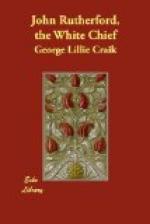“Perfectly tired of administering to his insatiable gluttony, which was still as ravenous as when he commenced, I now wished for a little intermission; and taking advantage of his situation, I resolved to give him as much to do as would employ him for at least a few minutes, while, in the meantime, it would afford me some amusement for my trouble. I therefore thrust into his mouth the largest hot potato I could find, and this had exactly the intended effect; for the fellow, unwilling to drop it, and not daring to penetrate it before it should get cool, held it slightly compressed between his teeth, to the great enjoyment of his countrymen, who laughed heartily, as well as myself, at the wry faces he made, and the efforts he used with his tongue to moderate the heat of the potato, and bring it to the temperature of his gums, which were evidently smarting from the contact. But he bore this trick with the greatest possible good humour, and to make him amends for it, I took care to supply him plentifully, till he cried out, ’Nuee nuee kiki,’[AB] and could eat no more; an exclamation, however, which he did not make till there was no more in the baskets."[AC]
FOOTNOTES:
[Footnote S: tapu’d.]
[Footnote T: “Moeurs des Sauvages Ameriquains.”]
[Footnote U: “Moko” is the accepted form of spelling the word.]
[Footnote V: “Account of New Zealand.”]
[Footnote W: Probably Rakau.]
[Footnote X: This is the name given in the deed of sale, dated February 24th, 1815, but the correct spelling is probably “Kuna” or “Kena.”]
[Footnote Y: Hokianga Harbour.]
[Footnote Z: Probably Muriwai, a celebrated Hokianga chief.]
[Footnote AA: Mr. S. Percy Smith, of New Plymouth, states that this word was very common in New Zealand fifty or sixty years ago. It was applied to servants, and was derived from the English word “cook.” In Maori it is “kuki.”]
[Footnote AB: This means “plenty of food,” or “sufficient”; but it is European Maori. One Maori, speaking to another, would say “He nui te kai.”]
[Footnote AC: The best account of the operation of the law of tapu is given by Judge Maning in “Old New Zealand.”]
CHAPTER IV.
Rutherford remained at the village for about six months, together with the others who had been taken prisoners with him and who had not been put to death, all except one, John Watson, who, soon after their arrival there, was carried away by a chief named Nainy.[AD] A house was assigned for them to live in, and the natives gave them also an iron pot they had taken from the ship, in which to cook their victuals. This they found a very useful article. It was “tabooed,” so that no slave was allowed to eat anything cooked in it; that, we suppose, being considered the surest way of preventing it from being stolen.




